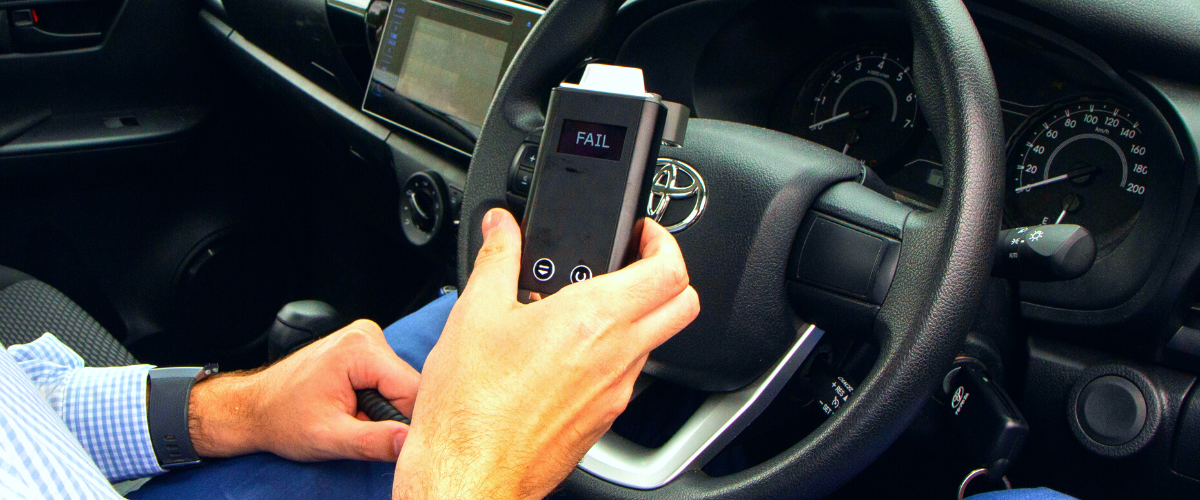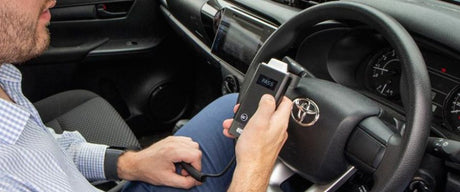Alcohol interlocks, also known as breath ignition interlocks or simply ignition interlocks, are devices usually installed in vehicles to prevent intoxicated individuals from driving. Once installed, the driver is required to blow into the device and register a specific blood alcohol concentration (BAC) level before the car can start.
When does an alcohol interlock need to be installed?
Usually, alcohol interlocks are installed as part of a court order for more serious drink driving offences. However, different states employ different drink driving penalties to curb occurrences on the road, which mainly include licence disqualifications, fines, alcohol interlock orders and for severe cases, jail time.
Some individuals, however, voluntarily install alcohol interlocks in their vehicles to avoid drunk driving incidents from happening.
How does it work?
After a drink driving case has been settled and an alcohol interlock has been ordered, the driver in question is required to seek an alcohol interlock supplier that their respective state government has approved.
The device will need to be installed by a professional technician. The alcohol interlock device will be connected to the engine to ensure the car can only start if an alcohol breath test is successful. Court mandated alcohol interlock orders require a zero BAC level for the car to start. If the device detects alcohol in the driver’s breath, the interlock will prevent the engine from starting.
Once the vehicle is in motion, the interlock will prompt the driver to take additional breath tests to avoid drivers drinking while driving. This usually happens at random intervals. If the driver fails one of these tests, the interlock will record the incident, and an alarm may be triggered until the driver pulls over and turns off the engine.
Alcohol interlocks usually record test results for the review of relevant authorities for monitoring purposes to ensure that the driver is in compliance with the interlock programme.
For voluntary alcohol interlocks, the BAC limit can be set by the driver. Organisations may install this as a precaution to ensure that employees do not operate machinery and vehicles while under the influence.
Individuals may choose to install this for safety purposes.
Benefits of an alcohol interlock
Research has shown that having an alcohol interlock installed in a vehicle makes drivers up to 86% less likely to commit drink driving offences and slightly less likely to commit any more alcohol-related driving offences in the two years after the interlock has been removed.
Another study also showed that the installation of alcohol interlock devices could prevent between 97 to 388 road fatalities per annum while preventing thousands of injuries when on the road. Some common reasons to install an alcohol interlock in your vehicle are:
- Preventing drunk driving – Alcohol interlocks nip drunk driving problems in the bud by preventing driving altogether. Apart from this, it also encourages responsible behaviour since drivers will know that in order to drive, they cannot be intoxicated.
- Helping to reduce repeat offenders – Research previously discussed in this write-up shows evidence that installing alcohol interlocks will reduce the chances of repeated offences.
- Increased safety – Their BAC readings will tell them otherwise even when drivers may not feel intoxicated. Through alcohol interlocks, drivers will have no choice but to record appropriate BAC levels before driving, thus keeping themselves and the public safe.
- Personal responsibility – Voluntarily installing an alcohol interlock reflects a concern for personal safety and responsibility on the driver's part.

Costs of an alcohol interlock
Apart from monthly rental fees, installation costs and removal costs that are required to be paid for the alcohol interlocks, the offender also incurs a host of other non-monetary costs. Some of these costs include:
Personal inconvenience
Having to locate an authorised alcohol interlock device supplier and getting the device installed is already time-consuming on its own. On top of the monetary costs to be incurred, the driver may need to arrange alternative transportation methods to go about their day normally.
Stigma and embarrassment
Driving with an alcohol interlock can signal to others that the driver has had alcohol related run-ins with the law and may start unwarranted claims of the driver being an alcoholic.
Time-consuming
Alcohol interlock orders are usually paired with alcohol education or treatment programmes, which can take a good bit of time out of the driver’s day.
Social isolation
The court mandate will likely force the driver away from any social gatherings involving alcohol.
Mental health
The stress and anxiety that’s associated with complying to alcohol interlock orders can take a psychological toll on the driver.
From the pointers discussed here, it’s clear that alcohol interlocks are highly effective in reducing the risk of drunk driving and can save lives and lessen the number of repeat offenders.
Andatech offers voluntary alcohol interlocks to help protect friends and family members from drunk driving and keep them safe from alcohol when on the road.
If you’re looking for a substitute to voluntary alcohol interlocks, you’ll find that AlcoSense personal breathalysers are more affordable, portable, and can also measure accurate and reliable BAC readings.
Browse AlcoSense’s range of personal breathalysers or speak to us to help determine your ideal breathalyser.





